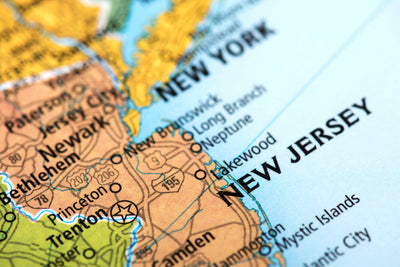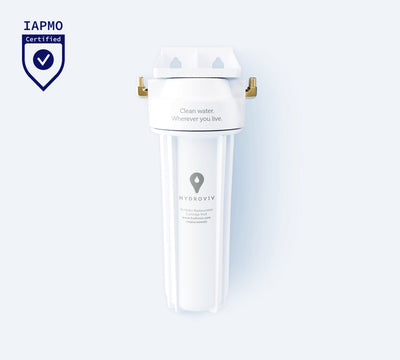PFAS Water Filters for New Jersey
RSS
Christina Liu | Hydroviv Science Team
The State of New Jersey recently become one of a handful of states to implement testing requirements and water quality standards for 3 different types of PFAS. PFAS or Per and Polyfluoroalkyl Substances, are a federally unregulated contaminant known to cause adverse health effects, including cancer. These new requirements have forced municipalities to take a closer look at the safety of their drinking water. This article addresses what PFAS chemicals are, the "safe" levels in New Jersey drinking water, and water filtration brands that actually remove them.
PFAS in New Jersey
New Jersey was one of the first states to adopt drinking water standards for PFAS chemicals in June 2020. The New Jersey Department of Environmental Protection announced a maximum contaminant level (MCL) of 14 parts per trillion for perfluorooctanoic acid (PFOA), and 13 parts per trillion for perfluorooctane sulfonic acid (PFOS) in New Jersey’s drinking water. The Department previously established an MCL of 13 parts per trillion for another PFAS, perfluorononanoic acid (PFNA), on September 4, 2018. PFAS are considered "emerging contaminants" and have been detected in drinking water systems across the country, but still remain unregulated by the EPA.
As of July 2021, four New Jersey towns and a water supplier filed lawsuits against 3M, DuPont, and other manufacturers of PFAS for knowingly contaminating drinking water sources. These include the City of Camden and Township of Point Pleasant, who have filed suit in Federal Court in South Carolina, and the Borough of Hopatcong, Township of Pequannock, and the Middlesex Water Company who are suing in federal court in New Jersey, to cover costs of removing PFAS from the public water systems in order to comply with the new state regulations.
What Are Per and Polyfluoroalkyl Substances?
Per and Polyfluoroalkyl Substances (PFAS) are a category of harmful compounds that can be found in drinking water sources across the country. PFAS can take hundreds of years to degrade in the environment which is why you may see them referred to as ‘forever chemicals.’ PFAS are not currently regulated at the federal level, but some states have created regulations or monitoring criteria, including New Jersey. PFAS are known to increase the risk of cancer, increase cholesterol, increase the risk of miscarriage by 80-120%, and several other negative health outcomes. According to the National Institutes of Health, over 4,700 different PFAS variations have been used in some type of manufacturing since the 1950’s.
Is 13 ppt Safe?
There’s a bit of uncertainty around the “safe level” of exposure to PFAS compounds. There are only a handful of studies that assess associated health impacts, and most agree that more research is necessary to make a determination. In 2016, EPA set a non-enforceable Health Advisory Level of 70 parts per trillion for combined PFOA and PFOS. More recent data suggests that this level is far too high to provide meaningful protection against a range of negative health impacts. A different study found that a “safe level” or PFAS could be as low as 0.1 parts per trillion. Although the New Jersey PFAS standard is on the low end of state limits, our team would rather see even less PFAS allowed in municipal tap water.
Not All Water Filters Remove PFAS
If you live in New Jersey and you’re looking for a solution, it’s important to understand that not all water filters are able to remove PFAS chemicals. Duke University completed a study in 2020 that tested various filtration brands and their ability to remove PFAS from drinking water. The results found that popular brands including Brita and Pur did not do a good job of removing PFAS compounds. Refrigerator filters tested by the Duke research team, including; Samsung, Whirlpool, and GE, also failed to remove PFAS. The full results of this study can be found here. Hydroviv filters are both NSF certified and third-party tested to remove PFAS chemicals. To request our full testing and removal data, please email hello@hydroviv.com.
Other Articles We Think You Might Enjoy:
Are PFAS Toxic to the Immune System?
Yale: PFAS Increase The Risk of Miscarriage by 80-120%
Federal PFAS Roadmap and National Strategy




